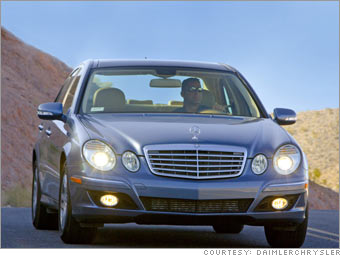With its low-revving engine, the E320's tach dial only goes up to 4,600 rpm. In this car, the diesel is steady and quiet at idle and even quieter at speed. In deference to sensitive American ears, the U.S.-market E320 has extra sound-damping insulation. Also, the extra emissions controls required of a car, as compared to an SUV, further choke off noise coming through the exhaust.
The only performance cost is a bit of "turbo lag." Accelerating to highway speeds from a dead stop in the E320 CDI is like being pulled by a giant rubberband. Speed builds a bit gradually at first. Then, as RPMs rise and the turborcharger kicks in, the rate of acceleration rises. Passing power, when the engine is already revved up to speed, is really impressive.
The main benefit of diesel, of course, is fuel economy. The diesel E-class actually goes farther on a gallon than the competing Lexus GS Hybrid. And, with the E-class diesel, you don't lose trunk space to batteries. The GS does accelerate more sharply, though, and it has much cleaner emissions, which is why the Lexus is available in all 50 states.
Fuel economy is 26 miles per gallon overall, based on 2008 EPA estimates, compared with 16 mpg for a V-8-powered E-class or 19 for the gasoline V-6-powered version.

